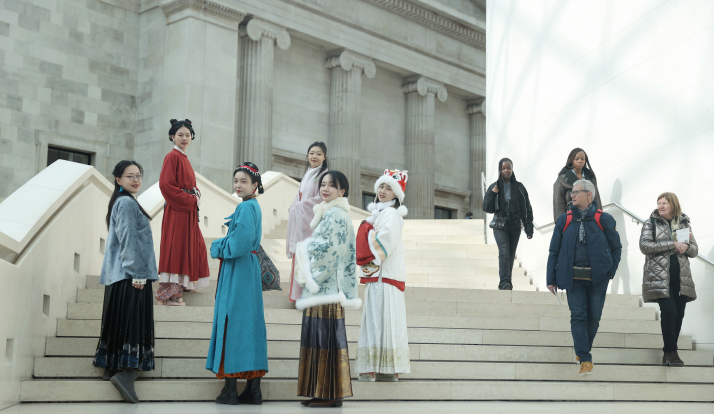| Lifestyle |
| Hanfu hype unites | |
|
|
 Enthusiasts dressed in their hanfu finest pose for a picture at the British Museum in London on February 25 (XINHUA)
About a decade ago, wearing hanfu, a traditional style of clothing worn by China's Han ethnic group, was considered more of a hobby, with a relatively small number of Chinese individuals participating in the trend. Currently, there is a notable shift as young consumers in China are urging brands to acknowledge their heritage and adapt to it to influence the market. The hanfu movement rather suits this rhetoric, advocating cultural autonomy infused with a touch of patriotism—a perspective echoed by experts tracking this social trend. In a bid to showcase this traditional type of Chinese clothing to a global audience, Shanghai Fashion Week Spring/Summer 2021 prominently featured hanfu. One key appeal that is very attractive to Western audiences is its perceived gender-neutral nature, which aligns with the progressive attitudes toward gender expression among youth in Europe and North America. Many Chinese Gen Zs have come to realize that fashion is not exclusive to Western styles; they have also recognized the allure and appeal of their own traditional garments. Cultural confidence has played a significant role in popularizing these traditional clothing choices. A notable indicator of hanfu's increasing influence was seen when Cheng Xinxiang, a deputy to the National People's Congress (NPC), China's top legislature, as well as an intangible cultural heritage inheritor of Hunan embroidery, submitted a proposal on establishing a national hanfu day at the annual NPC session in March 2021. Jun Baoyuan, a 24-year-old graduate from the Beijing Institute of Technology, told me that people who develop an interest in hanfu will in turn learn more about the traditional skills rooted in Chinese culture, including cloth weaving and traditional jewelry handicrafts. She also noted that many of her close friends today had entered her life as a result of their shared passion for hanfu. Jun often shares her hanfu-clad adventures on Douyin, the Chinese version of TikTok, where she has gathered a 60,000-strong following. Serendipitously, the person from whom she acquired her first set of traditional garments turned out to be her future husband. As her reputation as a high-flying hanfu model grew, she started collaborating with museums in China and participating in a range of events, including charity events alongside ambassadors and their spouses. But Jun also warned that with the popularity of hanfu events and the rising number of enthusiasts who want to join the movement, some merchants have fueled unfair competition by selling poor-quality hanfu garments at high prices. These days, making sure you get your money's worth requires a good deal of knowledge." The hanfu movement and the bigger guochao (literally meaning "national wave," which refers to products packed with traditional Chinese cultural elements) trend are among the most significant currents in the contemporary young Chinese cultural narrative. They have brought a sense of pride and Chinese aesthetics to social media, where overseas Chinese, too, can express their heritage. Psychologically and culturally, the hanfu movement is playing a major role in shaping the new generation of young Chinese, blending modernity with tradition. It is nothing short of remarkable to see China's Gen Zs coming together to embrace and celebrate their customs. This contrasts with what we observe in Europe or the United States, where the responsibility of preserving and passing down traditional culture often falls on the older generations—rather than the younger ones. The future trajectory of the hanfu movement has yet to unveil itself, but it's surely a phenomenon worth monitoring. It stands out in the larger guochao narrative as the only aspect that has united people to form a social circle of culturally aware youth. The revival of Chinese culture has gained momentum and shows no signs of slowing down anytime soon. The author is a Polish alumnus of Tsinghua University Copyedited by Elsbeth van Paridon Comments to yanwei@cicgamericas.com |
|
||||||||||||||||||||||||||||||
|